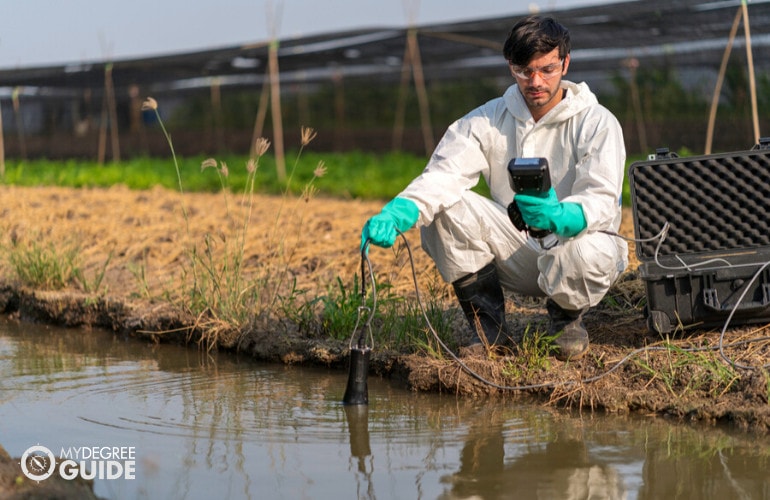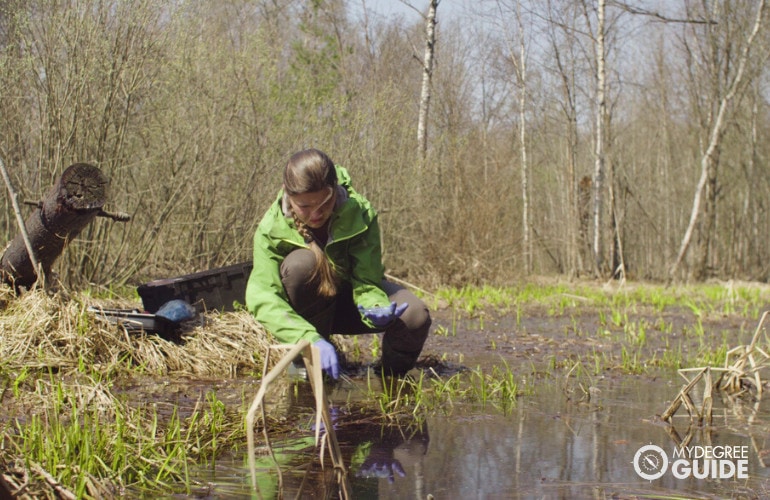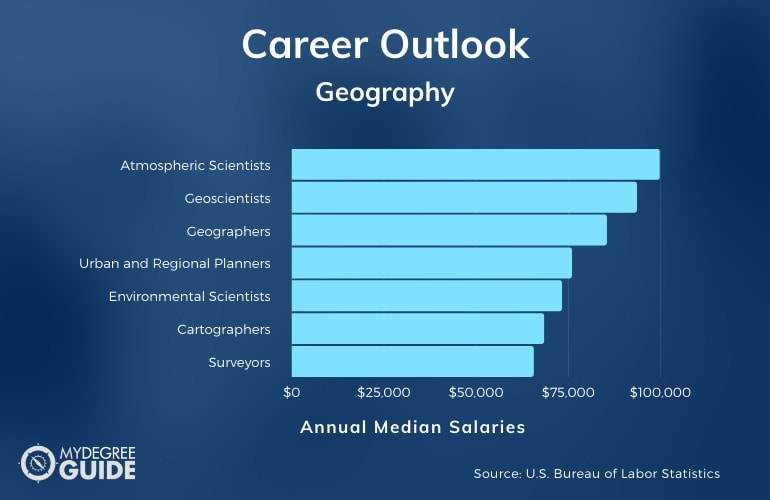Geography may have caught your eye as an intriguing major, but you may be thinking, “What can I do with a geography degree?”

Studying geography can introduce you to fascinating topics and intriguing parts of the world. You can also learn to collect data and apply your findings toward solving a range of problems that affect places and people.
Editorial Listing ShortCode:
Whether you’re interested in climate, soil, air, water, landforms, or other aspects of geography, a degree in this field may be the start of a satisfying career.
What Can I Do with a Geography Degree?

Geography majors sometimes become geographers—scientists who study the Earth and its people groups.
Geographers work with data and Geographic Information Systems (GIS) to uncover insights and inform future decisions. According to the Bureau of Labor Statistics, geographers most often work for the government or architectural and engineering firms. Not every geography major becomes a geographer, though.
Some students specialize in a particular scientific field, such as atmospheric, soil, or environmental science. Others choose to pursue urban planning, surveying, or mapmaking roles.
Nearly all of these lines of work will make use of the research and data-analysis skills learned in a geography program. Plus, professionals in these jobs often work with Geographic Information Systems (GIS).
Leadership roles in these fields may require experience or advanced degrees, but there are a number of entry-level opportunities for those who have recently graduated. Working as a technician can provide starting experience. Example roles include environmental protection, surveying, mapping, and agricultural science technicians.
5 Things You Can Do with a Geography Degree

There are many different careers in geography that graduates consider after earning a college degree in this field. Professionals may have jobs related to land or sky, cities or wilderness, fieldwork or office work.
1. Cartographer
Professionals who create or update maps are known as cartographers. This job can involve using surveying reports and imaging tools to collect data on a region.
Cartographers use the data to develop maps or other visual representations of a geographic area. According to the Bureau of Labor Statistics, cartographers often work for government agencies. They’re also useful in the architecture, engineering and consulting fields.
2. Atmospheric Scientist

A geography major who is interested in the ways that climate affects people and places might consider a career in atmospheric science. Some atmospheric scientists study current conditions, and others look for clues to learn more about historical weather patterns.
According to the Bureau of Labor Statistics, atmospheric science is one of the top-paying roles for geography majors. Also, jobs for this position are increasing at a 6% rate over the next ten years.
3. Urban Planner
Professionals who work in urban planning help make decisions about the best ways to use a city’s land and resources.
They can analyze zoning regulations or review development proposals. Urban planners work in cities, but there are also regional planners who oversee larger areas, such as counties. A bachelor’s degree most often leads to assistant roles in this field. Becoming a senior planner may require a master’s degree.
4. Environmental Specialist

Geographers can apply their knowledge of the Earth to help find solutions to environmental issues. Environmental scientists and specialists collect data and use it to solve problems. They may prepare reports or advise policymakers.
The Bureau of Labor Statistics says that environmental specialists often work for consulting firms, government agencies, or engineering organizations. Jobs in this area are growing at an 8% rate over the next ten years.
5. Geographer
Of course, working as a geographer is one of the top roles for a geography major. Geographers are scientists who study the layout of the Earth as well as the world’s political and cultural systems.
Professionals in this field may spend much of their time gathering data. They may use surveys, images, and other research methods. They can also analyze data to discover new insights or search for solutions to issues.
Geography Careers & Salaries

Geography majors work in a variety of roles related to the Earth, the atmosphere, and the relationship between people and their world. According to the Bureau of Labor Statistics, the median annual salary for life, physical, and social science occupations is $69,760.
| Careers | Annual Median Salaries |
| Atmospheric Scientists | $99,740 |
| Geoscientists | $93,580 |
| Geographers | $85,430 |
| Urban and Regional Planners | $75,950 |
| Environmental Scientists and Specialists | $73,230 |
| Cartographers and Photogrammetrists | $68,380 |
| Surveyors | $65,590 |
| Environmental Science and Protection Technicians | $46,850 |
| Surveying and Mapping Technicians | $46,200 |
| Agricultural and Food Science Technicians | $41,970 |
Geography graduates may begin with entry-level technician jobs and work their way up to more advanced roles with experience or additional education.
Why Major in Geography?

The field of geography covers a wide range of topics related to people and the planet. Geography degrees introduce students to various places in the world and the ways that humans and their environments interact.
If you’re interested in a field that combines science, data analysis, communications, and hands-on discovery work, then this major might be a good fit for you. In geography, you’ll probably engage in a mix of fieldwork and desk work. You can gain invaluable skills related to gathering and analyzing data.
After graduation, geography majors tend to pursue work as geographers, environmental technicians, soil scientists, or surveyors.
What Do You Learn in Geography?

In a geography degree program, you’ll typically learn about land, water, air, and weather. You’ll also discuss people groups and how they relate to their environments.
The two main branches of this field are physical geography and human geography. The physical branch focuses on the shape and structure of the Earth and its features, and the human branch addresses how people interact with the planet and establish social systems.
Course topics that are often covered in a geography program include cartography, geography research methods, geology of the Earth, and population issues. You can expect to learn about Geographic Information Systems (GIS) as well.
Is Geography a Good Major?

Yes, geography is a good major for many undergraduate students. Geography studies offer variety.
One day, you may get to conduct lab work with soil samples. The next day, you may create models using computer software. There may even be opportunities for you to engage in weeks-long study trips.
After graduation, a geography major may pursue work in a variety of directions, depending on their specialization. Many geography-related career paths can pay well, too.
For example, the Bureau of Labor Statistics says that atmospheric scientists make a median salary of $99,740 each year, geographers make a median of $85,430, and urban planners earn a median of $75,950. Government agencies need geographers, and private-sector organizations hire geography professionals, too.
What Jobs Can You Get with a Geography Degree?

Students who graduate with a degree in geography have been known to work in a wide variety of roles.
According to the Bureau of Labor Statistics, many geography professionals work for federal, state, or local governments. Others are employed by architectural, engineering, or research and development firms. Geography professionals also hold consulting positions.
Some work as agricultural scientists. Soil science and technology is a branch of this field that geography majors may be particularly suited for. Others pursue jobs in surveying and mapmaking. Roles in this sector include surveying technician, surveyor, cartographer, and photogrammetrist. Urban and regional planning is another relevant field for geography experts.
How Much Does a Geography Major Make?

According to the Bureau of Labor Statistics, most geographers earn between $53,630 and $117,100 each year. Federal government jobs often provide some of the highest salaries as well as the highest employment. The median salary for federal geographers is $92,080.
Atmospheric science is one of the most lucrative fields for geography professionals. The median income for that job category is $99,740, and those who work in research and development make a median of $110,790 each year.
Urban and regional planning is another top-paying job. Salaries between $46,830 and $118,280 are common (Bureau of Labor Statistics).
What’s the Difference Between Geology vs. Geography?
If you’re interested in studying a scientific field related to the Earth, then you could pursue geography or geology. Here’s how they compare:
| Geography | Geology |
|
|
While the names sound similar, geology and geography are distinct paths. In fact, if you are more interested in geoscience specifically, it may be worth looking into accredited on-campus or online geoscience degree programs.
Is a Geography Degree Worth It?

Yes, a geography degree is worth it for many students. This field of study helps equip you with the ability to collect and analyze data. As a result, most geography majors are ready to study problems and brainstorm solutions. These skills can be useful in a variety of roles.
Many geography courses are tech-focused, which is valuable in today’s job markets. Geographic Information Systems (GIS) skills apply to many industries. Geographers’ talents are also in demand. Jobs for urban planners are growing at an 11% rate over the next ten years (Bureau of Labor Statistics).
Positions for environmental science technicians are increasing by 8%, and agricultural and food science roles are growing at a 6% rate.
Getting Your Degree in Geography Online

Geography studies are highly relevant to the world in which you live. This major isn’t just about learning where to climb mountains or find a desert.
Rather, the field of geography deals with understanding the Earth and its occupants for the sake of finding solutions to important problems. If this field sounds like it may be right for you, then a geography degree might be in order. You can even earn your degree online from an accredited university.
Online college classes are engaging, effective, and flexible. For a geography degree that suits your scheduling needs, you can check out your options for accredited online geography degree programs.
